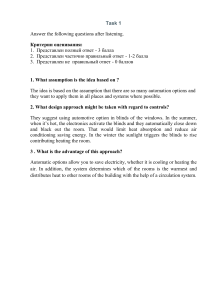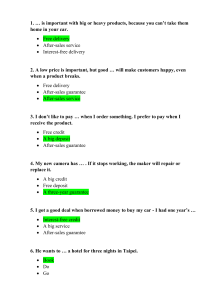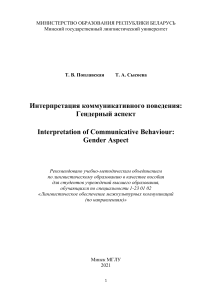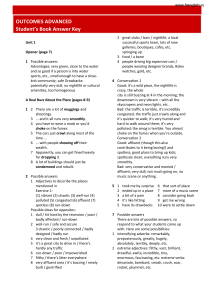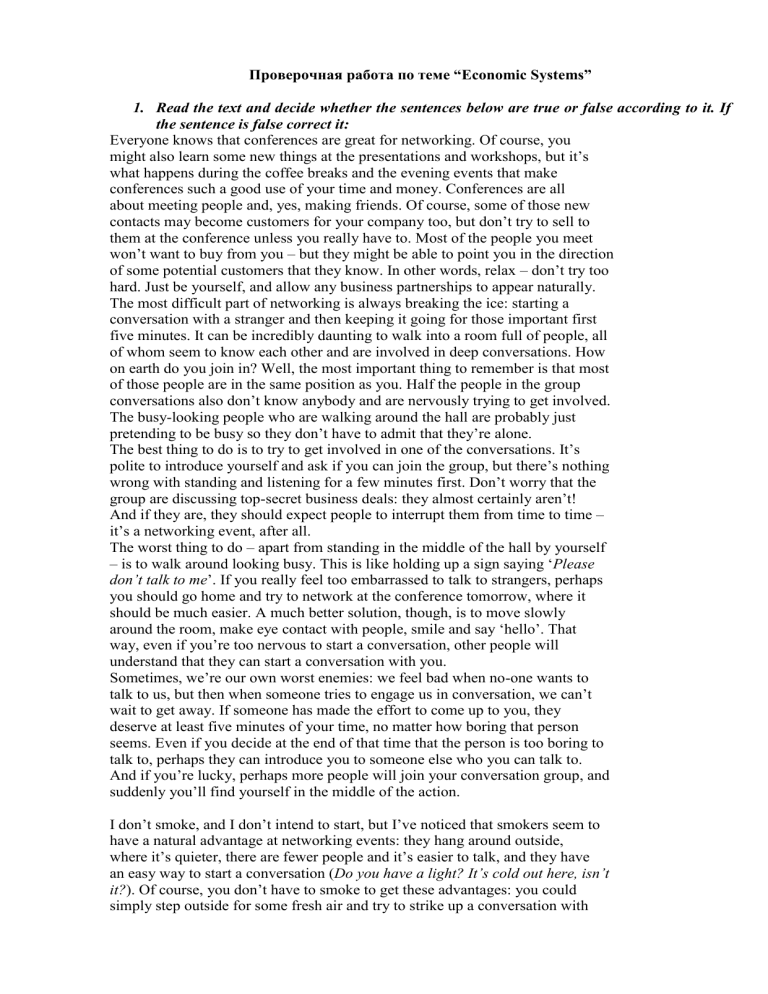
Проверочная работа по теме “Economic Systems” 1. Read the text and decide whether the sentences below are true or false according to it. If the sentence is false correct it: Everyone knows that conferences are great for networking. Of course, you might also learn some new things at the presentations and workshops, but it’s what happens during the coffee breaks and the evening events that make conferences such a good use of your time and money. Conferences are all about meeting people and, yes, making friends. Of course, some of those new contacts may become customers for your company too, but don’t try to sell to them at the conference unless you really have to. Most of the people you meet won’t want to buy from you – but they might be able to point you in the direction of some potential customers that they know. In other words, relax – don’t try too hard. Just be yourself, and allow any business partnerships to appear naturally. The most difficult part of networking is always breaking the ice: starting a conversation with a stranger and then keeping it going for those important first five minutes. It can be incredibly daunting to walk into a room full of people, all of whom seem to know each other and are involved in deep conversations. How on earth do you join in? Well, the most important thing to remember is that most of those people are in the same position as you. Half the people in the group conversations also don’t know anybody and are nervously trying to get involved. The busy-looking people who are walking around the hall are probably just pretending to be busy so they don’t have to admit that they’re alone. The best thing to do is to try to get involved in one of the conversations. It’s polite to introduce yourself and ask if you can join the group, but there’s nothing wrong with standing and listening for a few minutes first. Don’t worry that the group are discussing top-secret business deals: they almost certainly aren’t! And if they are, they should expect people to interrupt them from time to time – it’s a networking event, after all. The worst thing to do – apart from standing in the middle of the hall by yourself – is to walk around looking busy. This is like holding up a sign saying ‘Please don’t talk to me’. If you really feel too embarrassed to talk to strangers, perhaps you should go home and try to network at the conference tomorrow, where it should be much easier. A much better solution, though, is to move slowly around the room, make eye contact with people, smile and say ‘hello’. That way, even if you’re too nervous to start a conversation, other people will understand that they can start a conversation with you. Sometimes, we’re our own worst enemies: we feel bad when no-one wants to talk to us, but then when someone tries to engage us in conversation, we can’t wait to get away. If someone has made the effort to come up to you, they deserve at least five minutes of your time, no matter how boring that person seems. Even if you decide at the end of that time that the person is too boring to talk to, perhaps they can introduce you to someone else who you can talk to. And if you’re lucky, perhaps more people will join your conversation group, and suddenly you’ll find yourself in the middle of the action. I don’t smoke, and I don’t intend to start, but I’ve noticed that smokers seem to have a natural advantage at networking events: they hang around outside, where it’s quieter, there are fewer people and it’s easier to talk, and they have an easy way to start a conversation (Do you have a light? It’s cold out here, isn’t it?). Of course, you don’t have to smoke to get these advantages: you could simply step outside for some fresh air and try to strike up a conversation with someone who is standing alone out there. You may find that half of the ‘smokers’ aren’t actually smoking, just taking advantage of the natural opportunity to start conversations. Another natural place for starting conversations is the buffet or bar, even if the conversations are very superficial: Do you know where I can find the spoons? Could you pass me the milk? Of course, you need to be ready to follow up these ice-breakers with something much more engaging. So what can you talk about? The obvious thing to mention is the party itself – but whatever you do, don’t start moaning about how much you hate parties. Nobody likes listening to moaners. Why not ask if the other person knows a lot of people at the party, or if they are enjoying the party. Another great topic is the conference: did you attend any good presentations today? Are you giving a presentation yourself? Have you travelled a long way to get here? Topics like sport and the weather are fine for keeping a conversation going, but might not be suitable as an opening discussion. The same goes for work: by all means find out what the other person does for a living, but perhaps try a little small talk about the party, the conference or the food first. Finally, you may think that socialising in a foreign language would be harder than in your first language. In fact, in many ways it’s easier. You’ve got a great topic of conversation which other people will always find interesting: where you’re from. Many people will also treat you with more patience when they know you are a foreigner, and you are having problems with the language. Of course, you can’t just walk up to someone and say “Hi, I’m from Brazil”. It’s always better to start with a question about the other person, rather than a statement about yourself. But by choosing the topic, you’re making it much easier for the other person to follow up with a question about you: “And what about you?” So don’t hide, don’t walk around looking busy, and don’t try to escape from the first boring person who tries to talk to you. If you make an effort, you’ll find the experience a lot more enjoyable – and successful for your professional career. a) Communicating in a foreign language is harder than in your native one. b) The phrase “Do you know where I can find the spoons?”seems appropriate for starting a conversation in a café. c) Smoking provides an easy way to start a conversation. d) Opening a conversation with a question about where a person works is absolutely necessary . e) You must try your hardest and do your best to persuade a person to buy some of your products at the conference. f) Try not to show any sign of hating the parties. g) Trying to escape from the first boring person who tries to talk to you is a good idea. Ответ: True: False: 2. Match halves of the sentences to make up phrases useful for breaking the ice: 1. Excuse me. Do you … a. … a long way to get here? 2. Hello. My name’s XXX. Is it … b. … for a living? 3. Are you here alone … c. … good presentations today? 4. And what about you? … d. … have a light? 5. It’s cold out … e. … have you tried it? 6. I just came out for some fresh air – … 7. Sorry, do you … 8. Are you giving a … 9. This salad’s delicious – … 10. Do you know many … 11. Are you enjoying … 12. It’s a great … 13. Is this your first … 14. Did you attend any … 15. Do you know where … 16. Did you enjoy this … 17. Have you travelled … 18. What do you do … 19. Are you from … 20. Could you pass … f. … here, isn’t it? g. … I can find the spoons? h. … me the milk? i. … mind if I join you? j. … morning’s lecture? k. … OK if I join your group? l. … or with a group? m. … party, isn’t it? n. … people here tonight? o. … presentation at the conference? p. … round here? q. … the party? r. … there are too many people in there. s. … time at the conference? t. … Where are you from? Ответ: 1i 2j 3l 4t 5f 6r 7d 8o 9e 10 n 11 q 12 m 13 s 14 c 15 g 16 k 17 a 18 b 19 p 20 h 3. Translate into English: a) Спрос – это количество товаров и услуг, которые покупатели купили бы по всем возможным ценам. b) Предложение - это количество товаров и услуг, которое продавцы предложили бы для продажи по всем возможным ценам в определенном месте и в определенное время и которое изменяется вместе с ценой. c) Командные системы отличаются ярко выраженной и недостижимой для традиционных обществ способностью к мобилизации материальных и трудовых ресурсов, которая позволяет им осуществить такие крупномасштабные проекты как, например, Великая китайская стена или египетские пирамиды. d) Рыночная система является тем самым разрядом электрического тока, который стимулирует экономическую активность, пробуждая энергию конкурентной борьбы за прибыль. e) Цель смешанных экономик – избежать недостатком как плановой, так и рыночной экономик, и в тоже время пользоваться преимуществами, которые предлагают обе. f) К. Маркс и Ф. Энгельс писали в 1948 году, что менее чем за одно столетие капиталистическая система вызвала к жизни «колоссальные производительные силы, которые были неведомы всем предыдущим поколениям вместе взятым». Ответ: a) Demand is the quantity of goods and services that buyers would buy at all possible prices. b) The offer is the quantity of goods and services that sellers would offer for sale at all possible prices in a certain place and at a certain time and which changes with the price. c) Command systems are characterized by a pronounced and unattainable ability for traditional societies to mobilize material and labor resources, which allows them to carry out such large-scale projects as, for example, the Great Wall of China or the Egyptian Pyramids. d) The market system is the very discharge of electric current that stimulates economic activity, awakening the energy of competition for profit. e) The goal of mixed economies is to avoid the disadvantage of both planned and market economies, and at the same time enjoy the advantages offered by both. f) K. Marx and F. Engels wrote in 1948 that in less than a century the capitalist system had brought to life "colossal productive forces that were unknown to all previous generations combined."

